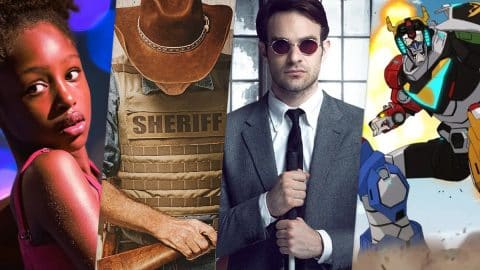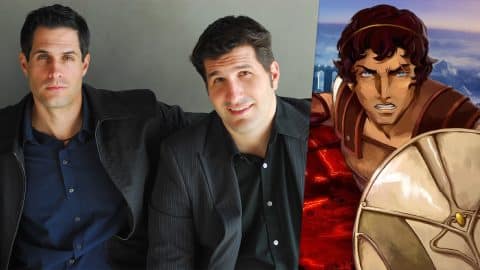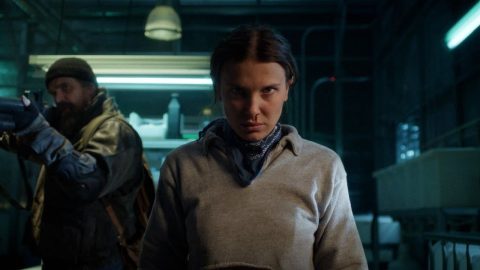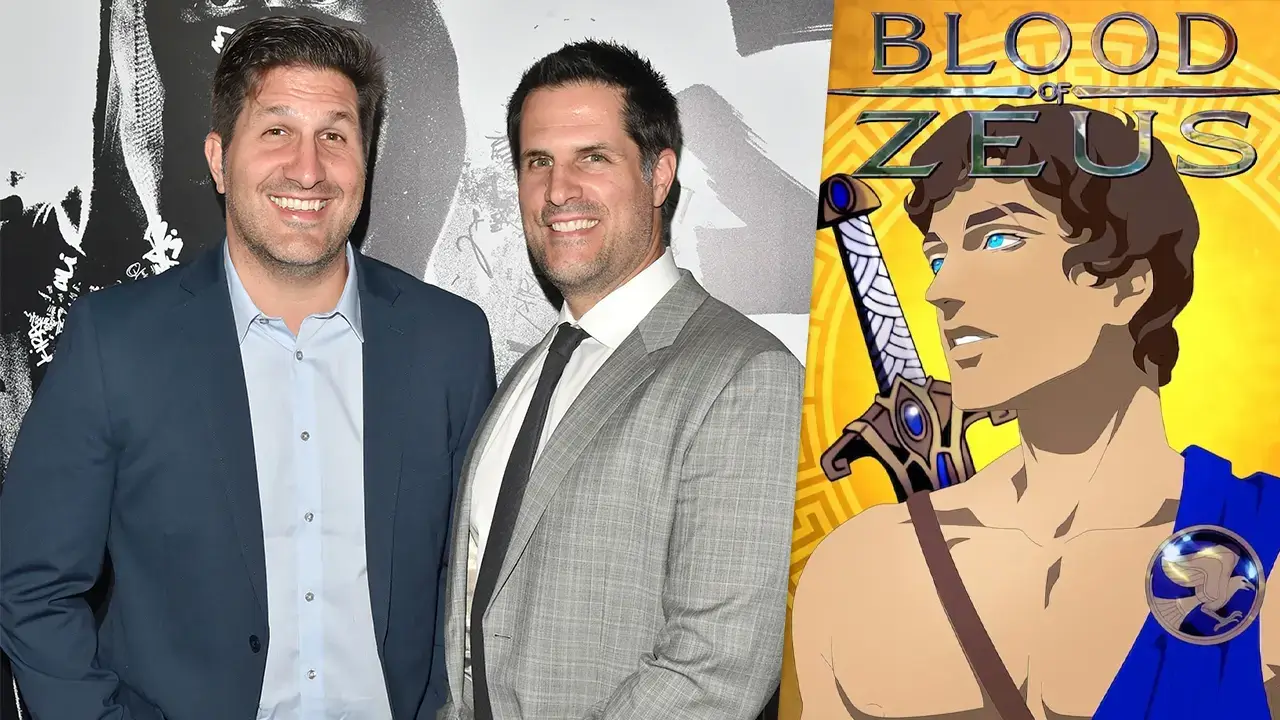
Picture via Netflix / Charly and Vlas Parlapanides
Blood of Zeus season 2 is now on Netflix! We sat down with the creators Charley and Vlas Parlapanides to discuss all things season 2 of the show and the future. Be pre-warned, though; this is a beefy interview!
Blood of Zeus is an animated Netflix Original series created by Charley and Vlas Parlapanides. The story is an original take on beloved Greek mythology centered on the original character of Heron, a mortal man who learns his true heritage as the son of Zeus.
Charley and Vlas previously wrote the live-action adaptation of Deathnote and were the writers of the 2011 fantasy-action movie Immortals, which starred Henry Cavill.
Blood of Zeus was a smash hit when it was released to audiences worldwide, exclusively on Netflix, in October 2020. The show was watched by millions of subscribers worldwide and swiftly earned itself renewals for a second and third season.
Below, we’ve had a delightful and detailed discussion with Charley and Vlas Parlapanides about Blood of Zeus, the second season, what we can expect from the third season, the brand-new project Medusa, and more.
Please Note: The interview below contains spoilers for the second Blood of Zeus season 2. This interview has also been edited for brevity and clarity.
Why has it taken so long to release the second season of Blood of Zeus?
Charley: Everyone was doing animation. And so, literally, we finished the script and then waited a year to find a studio overseas that could take on the work. So, you know, it was literally because everyone and their mother were doing animation, and all the pipelines were full. And so, you know, that delayed us. And then, you know, the two strikes that followed, you know, that also kind of, you know, dragged things out longer than we would have liked. So it’s just an unfortunate circumstance, you know. And the truth is that, I don’t know if people realize this, Powerhouse is still more like an indie rock label. They’re unlike the big studios with thousands of people employed at DreamWorks or Disney. And so it’s always about trying to pull resources together to make these shows.
Vlas: We want to apologize to all the fans because waiting that long is frustrating. So, you know, we want to say sorry. And we also want them to know, God willing, to all tune in.
Charley: Did you know they ordered a season three or not?
Jacob: Yeah! I remember reporting on it when they announced the renewal for the second season.
Charley: We won’t have to go through the whole rigmarole. Season three will not take that long. It’ll take about a year, it won’t take another three and a half years. We want everyone to watch and tell their friends, parents, cousins, and everyone else to watch. Because if we get a certain viewership number, Netflix will green-light our Medusa project. It’s an epic story. For us, one of the most iconic Greek mythological figures. So, if people want to see that show and if they’re going to see more seasons of Blood of Zeus, I hope that they turn out and watch in full force.
Jacob: It’s funny because, having been in this job for as long as I have, Blood of Zeus has taken roughly three and a half years for the second season to come out. In the back of my mind, and with season three already announced, it made sense to me that, hey, why don’t they bring it closer together so that the wait is not as long between seasons?
Charley: Sometimes, people don’t realize when shows get made. They’ll occasionally order two seasons from the outset. So when they started season one, they already made season two before season one dropped. Our show was genuinely experimental, where they did one season, and they said, let’s see if this works. The executive who bought our show, John Drudarian, was behind Castlevania, which worked. He told us that the only problem was that we wanted to do more animation, but some of these video game companies struggled with negotiations. And he’s like, I’ll spend two years just trying to get the rights deals closed. Do you guys have anything in the public domain? And that’s when we pitched Blood of Zeus. And so they tried one season, and it’s not like other shows where they produce two seasons, and then right away they order, it’s not like they renewed it, and then they ordered more. They ordered two seasons from the get-go.
Jacob: I can’t recall which of you quoted this, but I heard you describe Greek mythology as the IP. With animation, you have the issue that if an IP already has an established fan base and franchise, it’s hard to compete with. Take Powerhouse Animation, which has worked with Mattel on the He-Man franchise for the past few years. So, executives may think, “Well, this is already an established product,” and perhaps, or indeed, Netflix may have prioritized that. I’m not trying to put words in anyone’s mouth, but you’ve certainly got to stand out significantly. I know Blood of Zeus did exceptionally well everywhere, but didn’t it do exceptionally well in India? This was a surprise to Netflix, as they weren’t expecting Blood of Zeus to pop off in India.
Vlas: Why don’t you tell them the statistics? Charley mentioned the IP, which is very important because you have to cut through the clutter. You have to be able to draw eyeballs, and then you hope to keep those eyeballs glued to the screen.
So, I’ll let him [Charley] give you the peanut butter and jelly analogy, which I always love, but to keep going on with that thought, it was number two here in the States, and it would have been number one, but we had the juggernaut of The Queen’s Gambit. I’m proud that in the first 30 days, we had almost 18 million views.
In the first 30 days, I’m proud that it was not only one of the best-animated shows but also one of the animated shows that got the most views. It was one of the best shows on Netflix for getting views. When you compare it against movies, the live-action space, and the shows in the live-action space, it does really well. It was number one in over 40 countries, India being one. So, we were really happy that it turned out that well, but for us, it’s a testament to the popularity of Greek mythology. People worldwide love Greek mythology, and thank God they embrace the show.
Charley: At the time, in 2020, they [Netflix] were just starting in India, and there were a few territories that they told us that they had hoped for or believed in. They walked us through that there were 32 different buckets that they considered for their content. There’s romantic comedy, historical, and fantasy, and, you know, each show falls into different buckets that help push it toward people in their algorithm who enjoy those types of content. And so, they told us which buckets they thought we fell into and which countries they had hoped we would perform well in. At that time, India was not one that they thought we would perform well in, but they were just starting there and hoping to gain viewership. We were number one there, and we killed it there.
I think it speaks to the power of Greek mythology in our culture. I don’t know if we have Alexander the Great to thank, and that they have some semblance of like Greek culture from those times, or because they’re a multi-theistic, you know, country as well. But for whatever reason, the idea of Greek mythology and an animated show went together. It was like lightning in a bottle. It was like peanut butter and jelly coming together. When we were number one in India, our executives were so happy because that was not something they had expected.
We’re just very grateful for everyone in India who watched it because that went into the calculus of them ordering more. And maybe this is a little too much inside baseball, but the numbers we did exceeded their wildest expectations.
We asked Brad Graeber, the CEO of Powerhouse and an executive producer on Blood of Zeus, “Where do we need to land regarding viewership to get renewed?” And he said, “Listen, if you get 6 million viewers in the first 30 days, you’re in consideration, 8 million, they’ll order more for sure.” And we ended up at 17.8 million. So, in the first 30 days, we more than doubled what was like an automatic green light.
That’s why they ordered two more seasons. So even until Arcane, no other show performed like that in the animated space. First of all, the one thing I will say is that we love Castlevania. Not only do we love that show because it’s awesome, the OG Castlevania, but also, our show wouldn’t exist if it wasn’t for the success of Castlevania. But we surpassed even those numbers. I know there was a small discord group of Castlevania fans that were, like, vote-bombing our show because they didn’t want our scores to be higher than Castlevania. It’s like, “Guys! We love Castlevania! No powerhouse on powerhouse crime, please.”
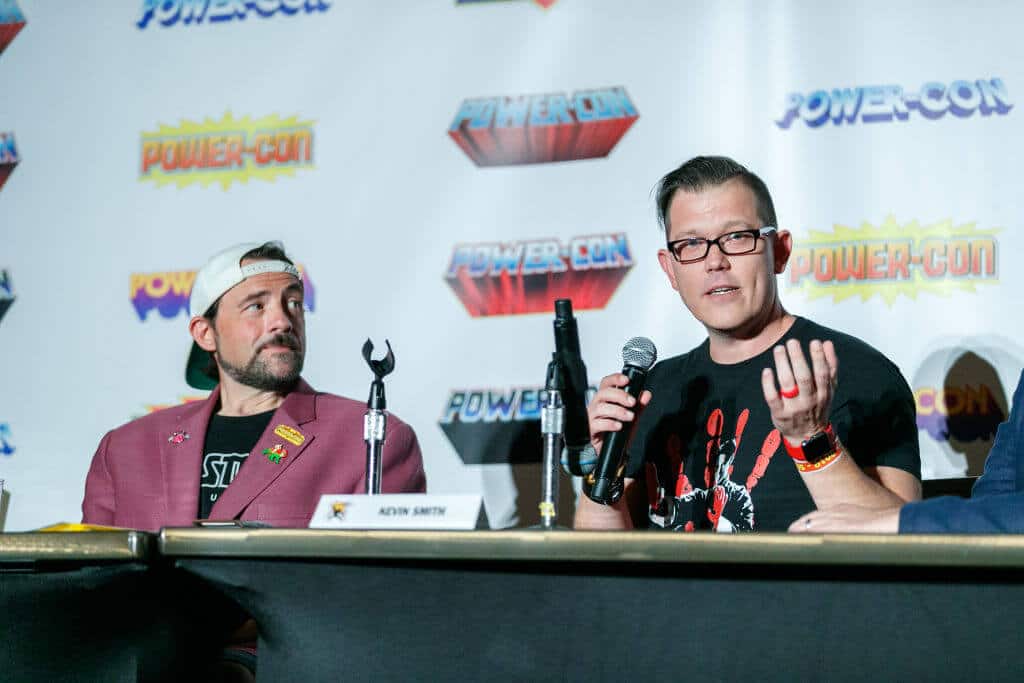
ANAHEIM, CALIFORNIA – AUGUST 18: Writer and director Kevin Smith and Brad Graeber, Powerhouse Animation’s CEO delighted He-Man fans at 2019 Power-Con with his announcement of a new anime show coming to Netflix: Masters is the Universe: Revelation. Smith will serve as writer and show runner and Smith and David will both serve as Executive Producers. (Photo by Rich Polk/Getty Images for Mattel)
Jacob: We’re all on the same side here. The tide rises all boats.
Charley: Exactly!
Vlas: We’re all part of the same family! And Charley was right. They were really hitting it to try and bring the scores down because they wanted the Castlevania scores to be better on IMDb and Rotten Tomatoes.
Charley: Someone contacted me about it, and I was like, “What are we going to do?” But sadly, it is what it is, and that’s the world we live in today. However, what is great is that I think we changed people’s perception of what can work in the animated space. As you mentioned, though, Jacob, we came out during this era of peak TV, and there’s so much content out there. Executives get nervous and ask themselves, what will cut through the clutter? What will get eyeballs? So normally, you need pre-existing IP, or in this case, Greek mythology, which we call public IP. It’s a public-domain IP. The world knows it, but nobody will sue you for using it, you know? And so we’ve been very fortunate.
Vlas: Just one last thing. Netflix has a policy of waiting at least a month before deciding whether to renew a show. With our show, we were brought in after ten days, and they said, not only are we going to renew season 2, we’re going to renew seasons 2 and 3. And so Brad, again, from Powerhouse was like, in all my years of doing this, I’ve never seen them do that. So that was a really lovely day. It speaks to the numbers and the views that we talked about.
Charley: But now the concern is, to be honest, Jacob, you know, after a three and a half wait, will the audience return? That’s where we’re a little nervous. You know, we can’t be the Olympics. We can’t show up every four years and expect people to jump back in.
Vlas: Even though the Greeks invented the Olympics!
Charley: So we’ll see. That’s the thing, to be honest, we’re most anxious about seeing whether the audience will come back because it’s a long time to wait.
Jacob: This isn’t to blow smoke up anyone’s backside or anything, but after watching the second season, I really do think the fans are gonna love it.
Vlas: Oh, thank you. Really appreciate that.
Jacob: I was really impressed.
So, what was it like working with Powerhouse Animation?
Vlas: It was great. We especially love working with Katie Silva. She did the designs for season one. She was fantastic. Working with her was a real pleasure. And Jesse Piles…
Charley: He did all the designs and backgrounds.
Vlas: He’s amazing. Someone who’s super talented and we loved working with him.
They were cool because they kind of let us do what we do. Charley mentioned Castlevania because A, we’re grateful as fans cause we love the show. And as Charley said, B, because it showed that, it basically allowed us to bring Blood of Zeus into fruition. It showed the world that, hey, animation is a thing. People will watch it. And if it wasn’t for that show, we feel that we wouldn’t have been able to bring Blood of Zeus to life. So yeah. So we’re very grateful, you know, with Powerhouse and working with them.
Charley: This season was a little bit different than season one. Season one, Powerhouse did all the pre-production. They did the boards. We had all the designers working on our show. But for season two, they weren’t available. They were working on other shows. So, they oversaw all of what was being done overseas. So it was a slightly different scenario, but the people they have there are so talented. It’s like an abundance of riches that they have. It’s just, all these shows that they produce, we’re all trying to pull these people in and be like, hey, can we get Katie to work on this? Or can Jesse take a look at this scene? You know, always trying to wrangle them in and get them to work. And, cause they’re just great. That’s why they’re in such demand.
Jacob: Between yourselves and Blood of Zeus, they have He-Man, Castlevania, Castlevania Nocturne, Seis Manos, which unfortunately didn’t get a second season, and Tomb Raider, which is coming later this year, so busy, busy.
Charley: And the King Kong show they did.
Vlas: They’re really just good people. They work hard, and they’re so creative.
Charley: No one cares more or works harder than Brad Graeber. He wears it on his sleeve. He’s in there in the trenches, the CEO. Brad’s not just a guy who’s showing up, sipping his latte, and cracking the whip like he’s in there doing the work, fighting for projects.
We love Brad. And besides looking a lot like Josh Brolin, he’s a great guy. If you ever see a photo of him, he could be in the Goonies sequel if Brolin doesn’t want it. But he’s just A plus. And we have nothing but the utmost respect for Brad and some of his lieutenants, including our producer, Mike Hughes.
Vlas: You know, he also takes his job very seriously, and he feels responsible for the people who work for him. He’s always looking to procure work. So that’s another reason to watch Blood of Zeus; we want to give them more work.
If the last name wasn’t obvious, you’re both Greek, aren’t you?
Vlas: It’s Irish!
Jacob: Your heritage inspired you to write a story based on the Greek pantheon, right?
Vlas: Well, you know what? We remember being told the Greek mythological tales when we were kids. Our Yaya [Grandmother] used to tell them, and we really remember being enthralled and engaged by those stories and taken by those stories. It created a certain feeling deep within where you were just entertained. I didn’t know it then, or we didn’t know it then, but it was escapist fare in many ways. It was really imaginative, and you were taken on a journey. The beauty of it is that a lot of the characters were flawed. So they were relatable in many ways, but there were heroes, and there were monsters, and there was good, and there was evil. So, when it came time, Charley had the idea for the Blood of Zeus. But I think what we also tried to do if at all possible, was recreate the feeling that we had when we first heard those stories. We wanted the audience members to have that when they watch the show.
We wanted them to be entertained. We wanted them to feel, to create an escapist fare where you’re brought into a world, you’re brought onto a journey, and you almost forget about the world around you for a little bit. You’re focused on that story, and there’s good, and there’s evil. There are themes in there that we love, how to deal with anger, redemption, betrayal, forgiveness, which is something that Charley wrote, and it’s one of my favorites pieces at the very end of season two where Gaia wants to introduce the gods to this concept of forgiveness. That’s something I think the world can use more of right now. So that’s what we set out to do: tell a compelling, engaging tale and try to evoke the emotions that were evoked in us when we were kids and when we first heard those mythological tales from our grandmother and mother.
Charley: And, you know, we heard those stories growing up. We read the Odyssey and the Iliad, and I have always thought they were amazing. Then, we went to Greece and spent time there. We tried to get back to Greece as often as we could. I even remember being with my wife in 2005; we’re both married to Greek American girls who were, you know, of Greek descent but raised here in America like us. And we were in my wife’s father’s village, and there at the monastery, there was a space sticking out of the wall. It was for Dionysus because this was a temple to Dionysus, and now it was an Orthodox monastery. But to know that people who used to come here were part of the cult of Dionysus who would perform rituals, and you see these ancient places and these temples that still stand, that these people lived and breathed it.
How cool would it be to tell stories where the Gods are amongst the people? We’ve always loved Norse mythology. We’ve also read Catholic mythology, but Greek mythology stories are always tragic. Everything in Greek literature must be a comedy or tragedy, and the Greeks love to lean into tragedy. There’s something about that that just really inspired us. And to be honest, I always loved the story of Hercules. So, if you know the story of Hercules, a lot of what we do in Blood of Zeus is a deconstruction of that. With our culture, Greeks, we overdo it. Like My Big Fat Greek Wedding, we take credit for everything. But we’re very proud of our culture, and we’ve always been steeped in it.
It was fun to play in the sandbox. Whether we were Greek or not, I still love the idea that these gods were the first superheroes, how they interacted with the world, and how heroes emerged and fell. That was always fascinating.
Vlas: I do think, though, that being Greek American, it does lend authenticity to the show just because we know those stories, we’ve heard those stories, and we’ve read anything and everything on Greek mythology. So I think it helps bring about that authentic kind of nature to the show, for lack of a better word. We took liberties, of course, creative liberties, and that’s why we opened up season one the way we did. Hey, this is a tale you’ve never heard about, which gives us artistic liberty to take the story where we want it to go. And the fun of the show, or what we realized, was that we listened to our fans and critics, too. We do read stuff, so it does get through. One of the things that people enjoyed was that people who knew Greek mythology recognized the little tips of the hat that we would have in the show, where, oh yeah, that’s this story or that story.
Then there are other things that we played with where we said, well, this is known in the pantheon, this is known in mythology, but how about we say it was created and believed because of this reason, a different reason? Look at the traditional story through a different lens, which is what we did with the Persephone in Haiti story because there are various accounts of that story if you’re familiar with the mythological tale. However, we took a slightly different approach to their story and relationships. So it’s fun for people that are familiar with Greek mythology, and it’s also fun for people that are not familiar with Greek mythology. They can just enjoy the story.
Charley: I would add one thing, though, and I think this is important for people to understand the audience. There are certain mythological stories that I think you could adapt one-to-one, and that would still work. But you have to understand because sometimes people are like, well, “They changed this” or “They changed that.” Part of it is that we’re trying to pitch and win over executives, and they hear pitches all the time. And if you tell them just the story that they read back in high school or middle school, well, what’s new about that? Why would people watch? So part of the hook that we had is that, oh, this was an oral tradition. Some stories were lost. Here’s this new story. That helps. You see people sit up. People don’t understand that you have to win them over, the executives. They have to agree to buy it and produce it. So, sometimes, you have to put a spin on it. Do I think that’s necessary? No, I think there are many of these stories you could remake now with modern technology, and they would be amazing. You could give them the Lord of the Rings treatment, and they would work beautifully. But sometimes, you must change things to get past the gatekeepers, to make it feel fresh and new. That’s what we’re up against as writers. You have to pitch people and pitch your boss. Oh, this is the angle for the story. That’s what we have to do, too, as writers.
Vlas: He’s absolutely 100% correct. So, even for the Medusa show that we have, it’s our version of Wicked.
Charley: She’s not a villain! She uses her power to get revenge and get justice. She’s able to transform, and it’s more like the Hulk. She can become the Medusa Gorgon when she needs that power for revenge, not because she’s been cursed but because, if you’re familiar with that story, Athena punishes her because the temple got desecrated and she got attacked. That’s not cool. Really, Athena should be on her side. So, instead, she [Athena] gives her [Medusa] this ability as a weapon and not as a punishment.
Could we tell the original story of Medusa? Yeah, of course. But no one wants to buy that, and no one is willing to pay for that! So, you must put spins on things to engage people.
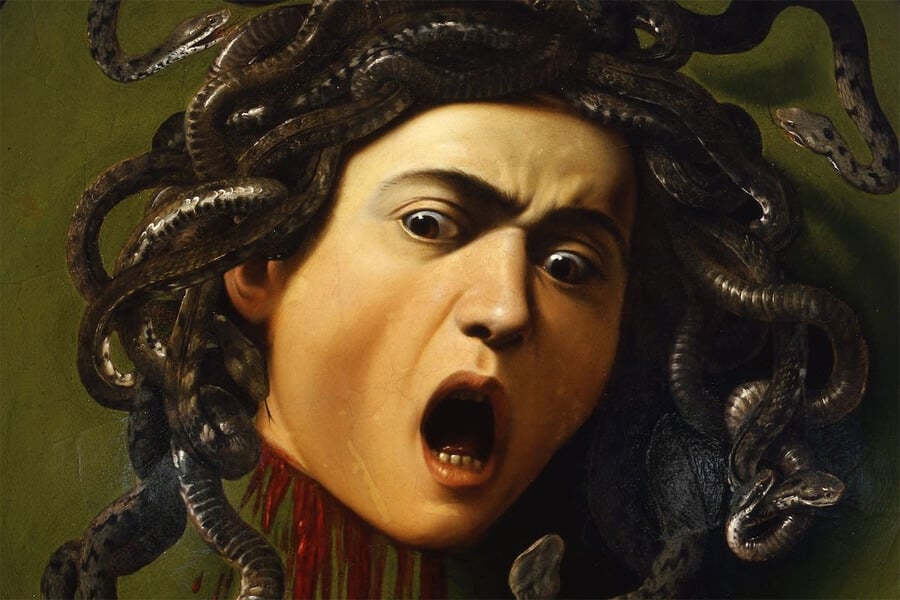
Picture: Caravaggio’s Medusa
Vlas: I brought it up. It’s because of what Charley said: you have to create something new to excite people. That very much applied to Medusa and what we’ve applied to Blood of Zeus.
Jacob: God of War is a franchise marinated in Greek mythology. Would that story have worked if it had followed Ares instead of Kratos?
Charley: Yeah, exactly.
Jacob: Even more recently, there’s Dragon’s Dogma 2, which I’ve not played yet, but from what I’ve seen, the world is inspired by tons of Greek Mythology.
Charley: I loved Hades. I love the gameplay, and I love the story elements. And I don’t know if you’ve played that, but the Ghost of Sparta story and the first three God of Wars were like a dream come true playing those games. But we also think there’s been a little bit of a Greek mythology renaissance, and part of it, such as Percy Jackson, for example, we get told on social media, “Oh, I grew up watching Percy Jackson, and now I’m in my twenties.” This is perfect; this is scratching the Greek mythology itch I still have, but now they’re a little bit older.
So I think Percy Jackson and God of War set the table for us, which brought all this stuff back to the forefront after a little hiatus. After Clash of the Titans, there wasn’t a Greek mythology movie for a while- Oh! No, there was also Hercules and Xena. Those were Greek mythology, too, but it really feels like a Renaissance now.
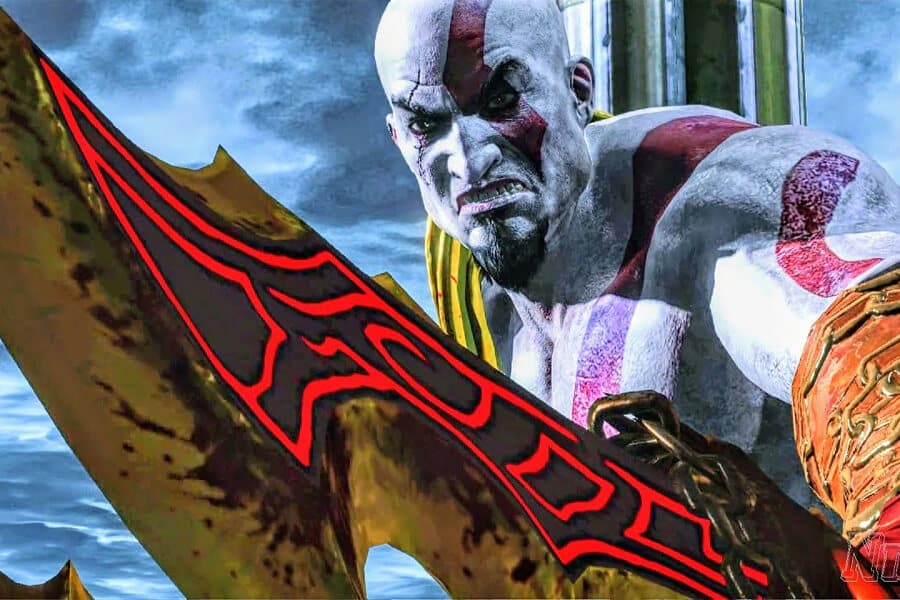
Picture: Kratos in God of War 3 remastered – Sony Computer Entertainment
Vlas: You have God of War being made into a live-action show at Amazon, and they’re also going to do an animated show. You’ve got Percy Jackson, us with Blood of Zeus, and then all of the video games you mentioned.
Charley: Hades 2 is going to come out! My daughter and I played the heck out of Hades. Oh! And there was a great game, Immortals Fenyx Rising. It’s a lesser-known name, but my daughter and I completed that. It was cool that they did a Blood of Zeus downloadable content pack. That was one of the highlights of our career for me. I couldn’t believe it.
Vlas: Jacob, how do you do it? Because now you’re a gamer, and you write and must watch these movies. Do you have enough time during the day to do everything you need to do?
Jacob: It’s one of those things I realize as I get older and how surprisingly good I can be at multitasking. There are moments when I have to stop what I’m doing and focus on the moment, but other times, my friend jokes about this and calls me lore-o-divergent. When it comes to fictional franchises, even if I’ve never read books or comics, played video games, or watched series or movies, I absorb that sort of information like a sponge. I love it.
Charley: Yeah, it’s interesting, Jacob, because these are all poems. Maybe it’s in your genetic code that a couple of thousand years ago, you’d be the one that would recite the full long poem and absorb it all sitting around the campfire because there was no script, and they weren’t writing it down.
Jacob: I love fictional stories- but it is fascinating when you think of Europe and the influence of the Romans, as the Roman Pantheon is mirrored to the Greek Pantheon, but the names of the Greek gods live with everyone.
Charley: Yeah! That’s true because nobody says Mars; they say Aries.
Jacob: No one says Jupiter; they say Zeus.
Charley: You know, I never really thought of it like that. We’re Greek, so of course, that’s interesting.
Vlas: It goes back to the story itself and the characters themselves. And even if you look at Zeus, he’s flawed. I mean, on the one hand, he’s very brave, and he leads the gods into battle, and he’s able to win, he’s able to take down opponents that you feel are impossible to overcome like Cronos, or whoever it may be.
Charley: When Typhon attacked everybody else, they said all the other gods transformed into animals, and they fled to Egypt. Only Zeus stood and fought, and then, because he fought for three days, everyone came back.
Vlas: And yet he cheats on his wife, left and right, he’s like Tony Soprano. So I guess that just makes him a more interesting character than, say, Jupiter. Right away, there’s something relatable about him.
So the character of Heron is based on Hercules?
Charley: Well, the inspiration was the story of Hercules. He [Hercules] was born to a royal family. He and his brother were sons of the King, and we always thought that it was interesting that Hera was trying to kill him. She sent snakes to kill him, but what we thought was interesting was that Epicles and Hercules end up becoming heroes together. They join Jason on the Argo, become Argonauts, and what we thought was, oh, the Hercules story is always kind of cool, but is there a way of instead of them being allies, the two brothers, that would we make them adversaries instead.
So that’s where the idea came from for Heron and Seraphim to be adversaries. Then, there’s also a little of Oedipus Rex,, where instead of sleeping with his mother, Seraphim kills his mother instead of his father.
What we also like about the Hercules story is that there was a prophecy that one demigod would save both the heavens and earth, which is then filtered into the Blood of Zeus. Nobody would care if you were to pitch Hercules; they would roll their eyes. There’s already so much of the Hercules story, especially young Hercules. After he kills his teacher, and he’s trying to regain his honor, that would be an amazing show, but you can’t pitch the straightforward version that people would just roll their eyes at what they feel has already been done to death or maybe they think that no one will ever do it better than Ryan Gosling, who played Young Hercules. But the bones of that story play an integral part in Blood of Zeus.
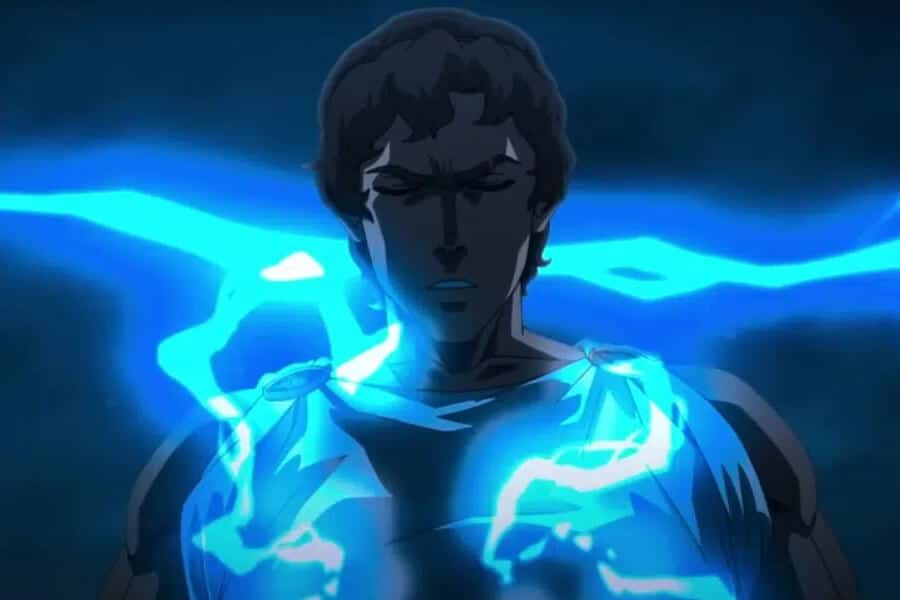
Picture: Heron in Blood of Zeus – Netflix
Vlas: To piggyback on that, it was also very personal to us. Our mother was born and raised in Greece; our first language is Greek, so even though we lived in New Jersey, we looked the way we looked, and we still often felt like we were outsiders a little bit. I’d bring food from home, like Spanikopita, that would smell, and people would look at us like, “What the hell is that?”
Charley: Yeah, it’s greasy, and the brown paper bag is all oily-
Vlas: Not peanut butter and jelly!
Charley: And our mom didn’t know any better. She grew up in Greece, she went to college there, she was a teacher-
Vlas: She had an accent when she came here. Our grandmother was persecuted just for being Greek-
Charley: The burning of Smyrna.
Vlas: She escaped the burning of Smyrna when the Turks burned the whole city.
Charley: It was the one hundredth anniversary two years ago, but she told us those stories, and I remember you asked Sofia, bro, and said how they marched the Armenians through, and she said she felt so bad for them because there were these Armenians and she offered to give them food and water and then the guy told them like no I’d rather just die. I want to die. I was always amazed, like why didn’t they leave, because you see what is doing the Armenians.

Picture: The burning of Smyrna in September 1922
Vlas: Yeah, our Grandmother had to hide in the basement so that she wouldn’t get raped. She saw some of her neighbors and close friends- some of them were just killed and murdered. Her father led the resistance and said, “Listen, we’re not going to make it out of here, but we’re going to buy time so that the women and children can leave,” and that’s what they did. Sure enough, they made an example out of him, and on our mother’s side-
Charley: They hung him. Our grandmother, afterward, learned from someone else later on Kyos, the island where the refugees fled, that they hung him from the tree by their house. That was meant to be a sign, a message of “This is what happens.” But, he said that they had to buy time to get the women and children to the harbor and on the boats.
Vlas: Our other great-grandfather was also killed by the Turks because he was an educated Greek. He’d gone to college, which was rare back then, so they tortured him and then killed him.–It isn’t kind, but the point is that we have a great deal of empathy for any group that is made to feel persecuted somehow. We gravitate towards outsiders, and Heron is the quintessential outsider.
He’s a bastard. He’s looked down upon and made to feel less. Now, we didn’t have that experience, but as a writer, you take the kernel of an idea, expand upon it, and dramatize it. It started with that, regarding his journey and the themes, we wanted to explore anger. So Heron has a lot of anger, and rightfully so. His journey is one where he finally lets go of his anger. That’s what he has to learn to do, and he finally can do that. In doing that, he’s able to tap into his divine power.
Seraphim also has anger issues, and he is not to let go of his anger, and in the end, that brings about his downfall. So we thought that would be an exciting way to explore anger through these two brothers, and Charley mentioned we wanted them to start as adversaries, but throughout their journey, the personal arc between two brothers, and I hope you get a sense of it in season two, we’re going to bridge the divide and hopefully get to a place that’s very cool in season three, but it’s all by design.
Charley: The last thing I would say is that we group around stories of war, mayhem, murder, and death, and so I think that’s why those are always in our stories because even though we grew up in a very suburban working-class town, we were always surrounded by these stories from the burning of Smyrna, World War 2, and then the civil war in Greece. Our mum told me the story of when the king had to flee because of the communist attack, and she cried in elementary school. Man, to think our mother had a king blows my mind, and well, actually, you’re from the UK, so you guys are used to that.
Vlas: But it’s true; we’re fascinated by how rural people can be to each other and how loving, brave, and heroic people can be in that dichotomy. You have the two extremes that we find fascinating.
Charley: It always repeats itself throughout human history. No matter how advanced we become. These things keep happening over and over again.
Vlas: That’s why we love ending with forgiveness. If you can’t forgive, then you can’t move on. Sometimes, you have to forgive and put the past behind you. We don’t still harbor animosity towards the people who did what they did to our grandmother. We have to move on, we have to heal, we have to grow, we have to move forward, and that’s very important.
Jacob: Well, that is interesting because when you look at how the gods act throughout Blood of Zeus, it’s incredibly human of them. Especially in the Hades and Persephone storyline and full disclosure, Hades was my favorite character in season 2.
Vlas: You’re the third person we’ve spoken to about his, and they love Hades too, so that’s great.
Jacob: All the characters were great, but there was something about the Hades storyline. This is a man in pain, and he couldn’t let go of that pain in the end, which may have brought about his downfall.
Vlas: That’s exactly it. One of the themes we wanted to explore was how everyone wants to protect their family. I have a daughter, a son, and a wife, and I would do anything to protect them and prevent them from being hurt and enduring pain year in and year out. The question then becomes, how far would you go, and how far is too far? Hades encapsulated that with his relationship with his family and Persephone. So, thank you for sharing that.
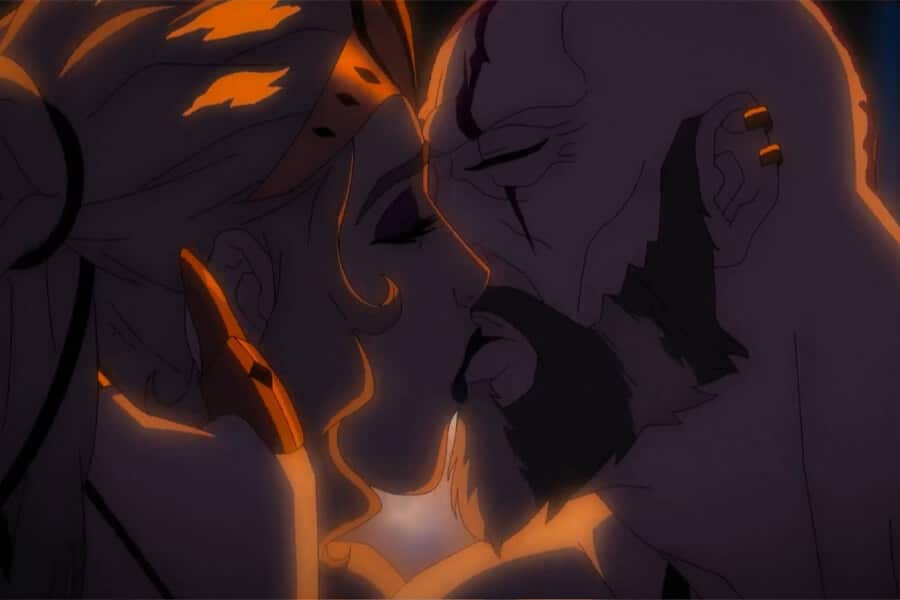
Picture: Persephone (left) and Hades (right) – Netflix
Charley: And you know what, Jacob, sometimes you read, you do research, you absorb it all, and then you kind of just let it percolate like we were reading, and through all the ancient texts, they always say that he was very wealthy and that he had all these treasures in the underworld and that he had all these realms that he was very lonely and part of it is we asked well, why is he lonely? We think if you are forced to be separated from your loved one for half the year for eternity, every time, every year over and over and over again, he’s described as having children. We know from ourselves that sometimes our wives have to do something, and the kids cry a little and are upset that they don’t want their mom to leave. So, imagine being this king but losing your wife, seeing your kids upset, and feeling like you can’t do anything about it, and then doing that for Thousands of years. What does that do to a character? So that humanized him, and we said, oh, this is where the loneliness and sadness come, let alone that he’s also a warden of a prison. But, we said, oh, that’s interesting, and that will drive his actions because Vlas always asks what they want. What does the character want? What do they need? Hades needs his wife.
Zeus and Hera were the most toxic relationship you could find, especially in season one. We wanted Hades and Persephone to have the best kind of relationship. They truly love each other, work together, and support each other, and he’s so deeply madly in love with her. She’s constantly being pulled away from him, but there’s going to be a point where he’s had enough and going to do something about the situation. That’s what’s driving him all through season two.
Vlas: Just one last thing, the gods are anthropomorphic, and so they have human characteristics. They’re not like the all-knowing, you know, Judeo-Christian god, And so I think Hades is the perfect example again. He’s just relatable. Is he perfect? No. But we understand what he’s doing, why he’s doing it, and we’re rooting for him, and maybe he takes things too far.
Charley: And Jacob, I’m glad you didn’t feel like he was a villain because the constant refrain we hear on social media is “don’t make him a villain,” and for us, he isn’t a villain. We understand why he’s doing what he’s doing, and we hope people are rooting for him. We’re rooting for him, but that was one of our concerns.
Jacob: By the end of the second season, it felt like there weren’t any typical villains in the show, but that didn’t stop anyone from taking villainous actions. For Example, Seraphim is slowly coming to terms with his past toward the end, which is nice to see, and the animosity between him and Heron is replaced by a slow-building sibling bond that is sadly ripped apart before they get a chance to grow. Who knows, maybe we’ll see that in season three? Even though Heron is deceased at this point, that doesn’t mean he can’t be judged by the three kings in the underworld.
I have already written about what we can see in my season three article, and one of those things is that Zeus’s death isn’t exactly permanent, especially when you have Seraphim, who walked out of hell. So, with Zeus chained up in Tartarus, there’s a chance he could come back.
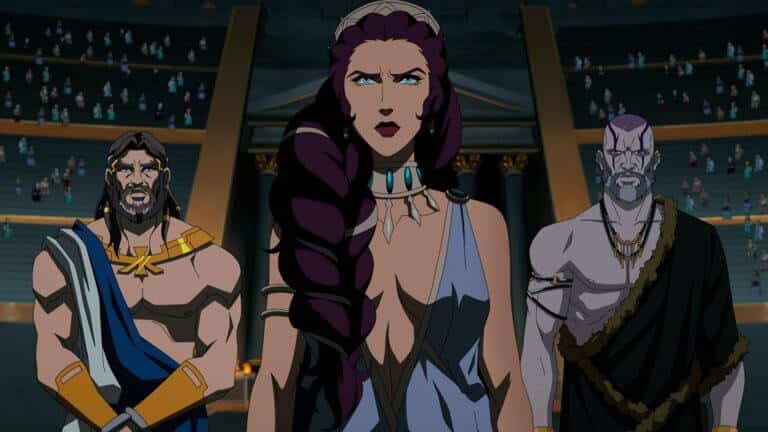
Picture: Zeus facing judgment in the Underworld in Blood of Zeus S2 – Netflix
Vlas: Well said.
Charley: You have very good instincts.
Jacob: I’ve just played a lot of video games. But when death isn’t always permanent, there’s always a chance they can return, and they’re called immortals for a reason.
Charley: Yeah, a couple of stories touched on this idea.
Vlas: We don’t want to ruin anything for season three. But what we will say, though, in addition to everything you’re saying, there also has to be stakes, which we introduce in season 3. You can’t keep coming back, and that’s introduced in season three.
Jacob: I was wondering because if there is no consequence to someone being pulled out of Tartarus, what is Tartarus’s point?
Charley: One of the judges has a line in season two where he says, “We should cast you into the abyss,” which we get a little more into in season three. And that’s complete and utter destruction.
Vlas: Game over!
Charley: Exactly, game over!
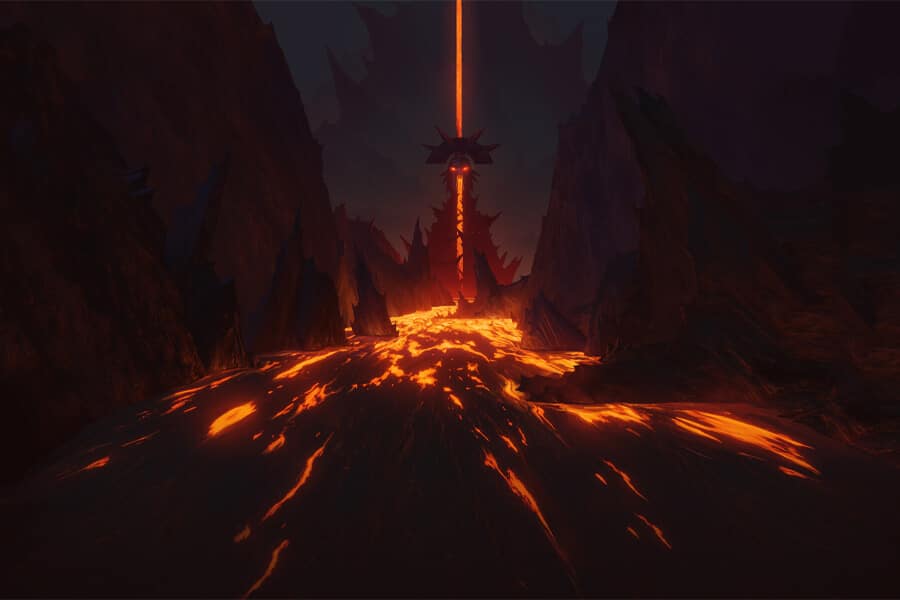
Picture: Tartarus in Blood of Zeus
Who is your favorite god from Blood of Zeus?
Charley: That’s a good question.
Jacob: We can also go outside Blood of Zeus for the original mythology.
Vlas: It’s really hard because there are things that I like about all the characters. Zeus comes to mind because he’s brave, and as Charley mentioned, when the gods are in peril and everyone else is afraid, he’s the one that rises to the challenge. He saved his brothers and sisters and yet seemingly always cheats on his wife. So there are parts of him that I like, but for me, it’s an amalgamation of taking different parts of all the gods.
There’s something I love about Hermes that I think is cool, and Athena is very wise, so I don’t think I have a favorite per se. What about you bro?
Charley: For me, it’s always the trio, the three brothers Zeus, Poseidon, and Hades. I know many gods in the Pantheon, but those are the original Mount Rushmore. As a kid, to think that a god could sling lightning was the coolest thing in the world, but that was when I had a basic understanding of Greek mythology. I know Zeus does many terrible things, but he was the king of the gods. He was at the top of Olympus, and when the thunder echoed, that was him. He could throw lightning, and I thought that was amazing.
Then I remember Dad telling us about Aquaman and finding out that he was based on Poseidon, a god who ruled the sea. Then you have Hades, who is almost this Batman figure in the shadows and all of that. So, those three resonated with me as a young kid before I even read the stories’ breadth. They always have a special place in my heart. There are so many cool gods and goddesses. But those three are at the forefront for me.
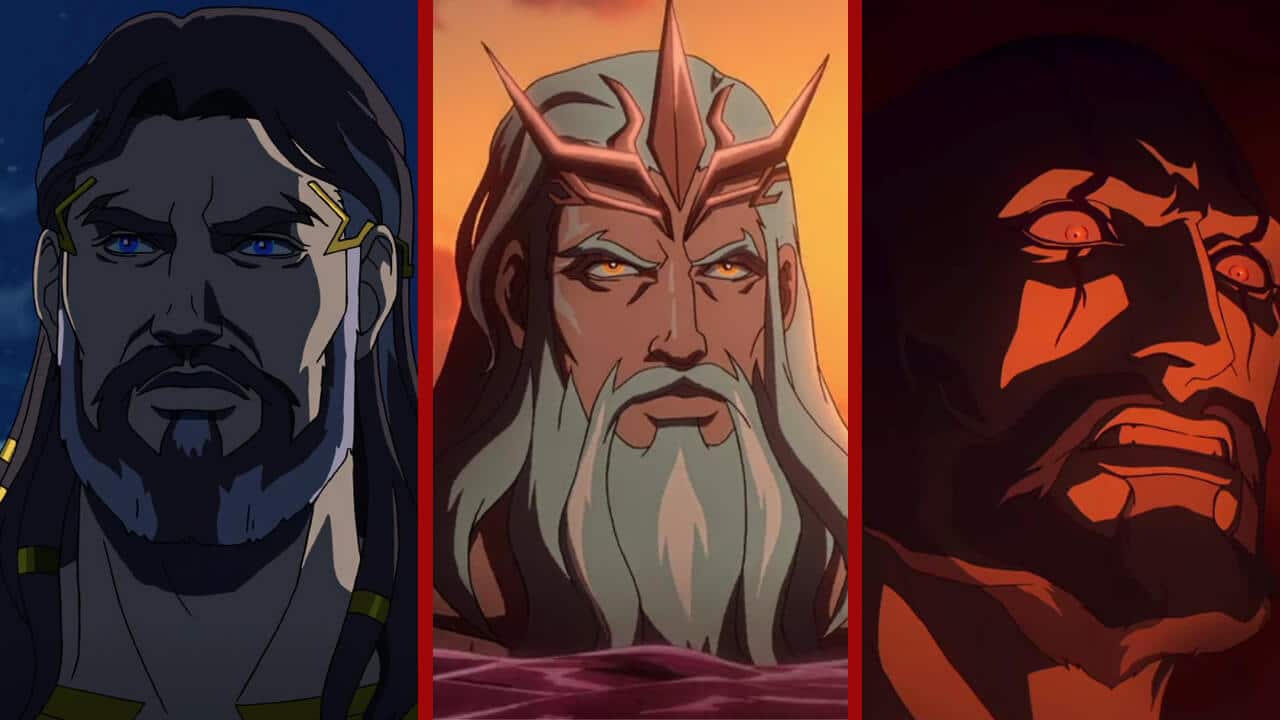
Picture: Zeus (left) Poseidon (center) and Hades (right)
Vlas: That’s a good answer. I would say the same. It’s a tie between the three brothers.
Charley: The story of Artemis is a story you could make into a movie just the way it’s written. She is an amazing character, but I didn’t discover this until later, so as a young kid, those three were really the spark.
Now, you see young kids with Marvel shirts, like Captain America, Iron Man, and Spider-Man. Those three were important to me growing up. I didn’t have the T-shirts or the cool merch, but they captured my imagination.
Vlas: Yeah, and those three in Blood of Zeus, in the real world, Hades wouldn’t be for me in that three, and let me be clear, it’s because of how he’s been depicted in pop culture. In mythology, he’s not the devil, so in Blood of Zeus, it’s a tie between the brothers. Outside of that, it’s between Zeus, Poseidon, and Hermes for me.
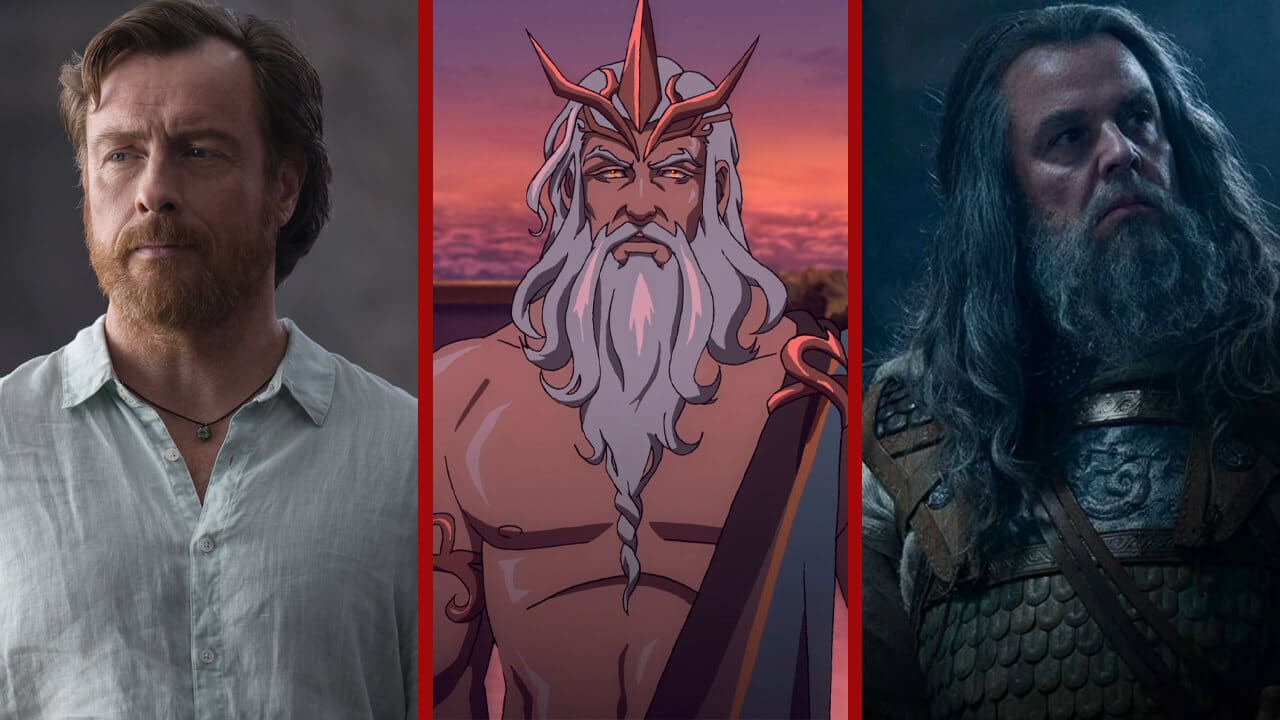
Picture: Poseidon as seen in different franchises: Percy Jackson (left), Blood of Zeus (center) and Clash of the Titans (right)
Jacob: For me, I love the design of Poseidon, but I would have to say Hades is my favorite. I’ve always been drawn to those more complicated characters. And then, outside of Blood of Zeus, it would have to be Apollo.
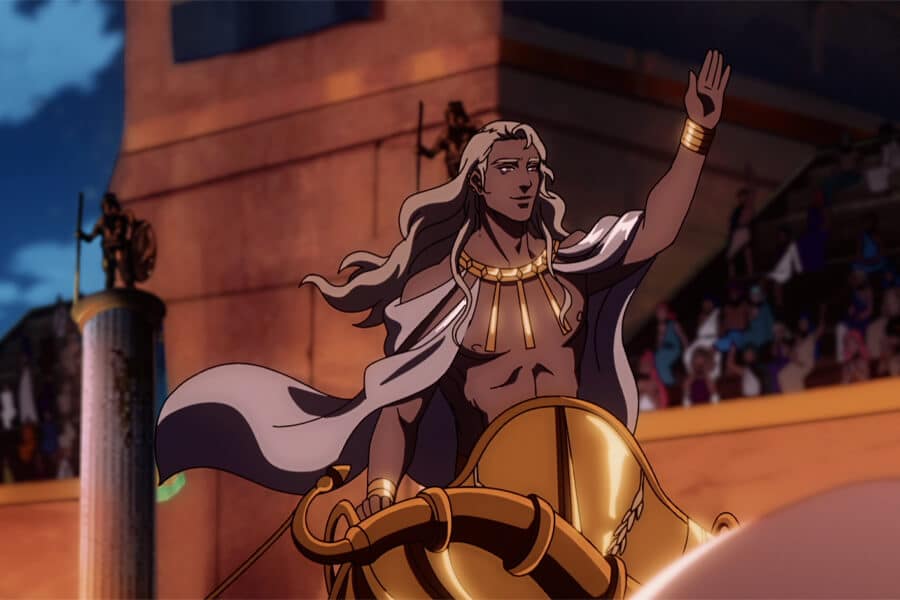
Picture: Apollo in Blood of Zeus – Netflix
Charley: That’s a very good choice; people love Apollo in the show, too.
Vlas: We love Apollo!
Charley: And Adam’s such a nice guy. The guy who plays him is super talented and such a good guy.
Jacob: I was looking through the cast list before, and it’s quite a list of talented actors.
Vlas: They were great. We were so blessed to have all of them. They all did a great job. Part of what we did, and this is by design, was treat this—and I know this may sound silly—like a movie.
We come from the feature world, And by that, I mean we wanted it to have a cinematic feel, so from the directing, from the music down to the performances that the actors gave, it was always through the lens of let’s try to make this as cinematic as we can And for the actors specifically we wanted to bring about emotional truth.
We really wanted to capture that whenever we could, and they embraced that. A lot of them had theater experience, And they brought that to the table, and I think it really made a difference. The performances are just fantastic. We’re very proud of those performances.
Jacob: One of the other things I was also impressed with was the score. It had this feeling of grandeur behind it that amplified the story.
Vlas: We have a very, very talented British composer. The music and score were a fan favorite in season 1. It’s great in season 2, and Netflix was so happy with it. They released an album, they have a vinyl album of the score, and they’re going to release an album for season two.
Charley: Our composer is just an amazing super talented human being, he’s just so great. He’s such a good guy. He’s so talented. It’s always some of our favorite days when we do the spotting and scoring sessions with him because Paul always surpasses whatever we had hoped for. We think he did an incredible job and keeps knocking it out of the park.
You know Netflix was really happy with the music that he did, so they made the vinyl. And I know his dad got to hear it, who was sick before he passed away, so I know that that was a kind of moment for Paul for his father to see the vinyl, listen to it, and see the show. He’s a first-rate composer and an even better human being. Paul is such a hard worker, too, because what he does for the amount of time he is given is amazing. He creates all of that on his Rig.
Vlas: He would kill it if he had an opportunity to work with a symphony. It’s not in the budget, but he’s so creative and talented and fabulous at knowing exactly what we want from moment to moment.
Jacob: I’ve always been a huge fan of music in movies and TV shows, and while it’s not a hot take, I’ve always thought there’s something about music that can amplify a story to the next level.
Vlas: They say what you hear is more important than even what you see, so the music just enhances that and can elevate the material. That’s what we feel Paul did with season one and season two.

Picture: Paul Edward-Francis
What can we expect from the third season if you’re allowed to reveal anything?
Vlas: It’s a freight train. It’s almost like Game of Thrones, where anything and everything can happen. You’ll say, “Oh my god, I can’t believe they just took it there!” Then we ratchet up another whole level, and we continue the journey between the two brothers and kind of try to close the divide between the two. We can’t wait for everyone to see where it ends up. It’s very cool and just an epic season. It’ll be sitting on the edge of your seat type of viewing experience, and what’s cool is that we’ve pulled no punches with Typhon. He’s gotten loose at the end of the second season, and he goes on a rampage when he partners up; I think the audience will enjoy it. Maybe we can share with bro? Like, not the actor?
Charley: But maybe the character? Well, we see Kronos returns, and he’s taking no prisoners. He’s throwing people into the abyss because he was told he would be overthrown and overthrown, but now, whoever poses a threat to him will be throwing them into the abyss, and they’re gone. They’re done. They no longer exist.
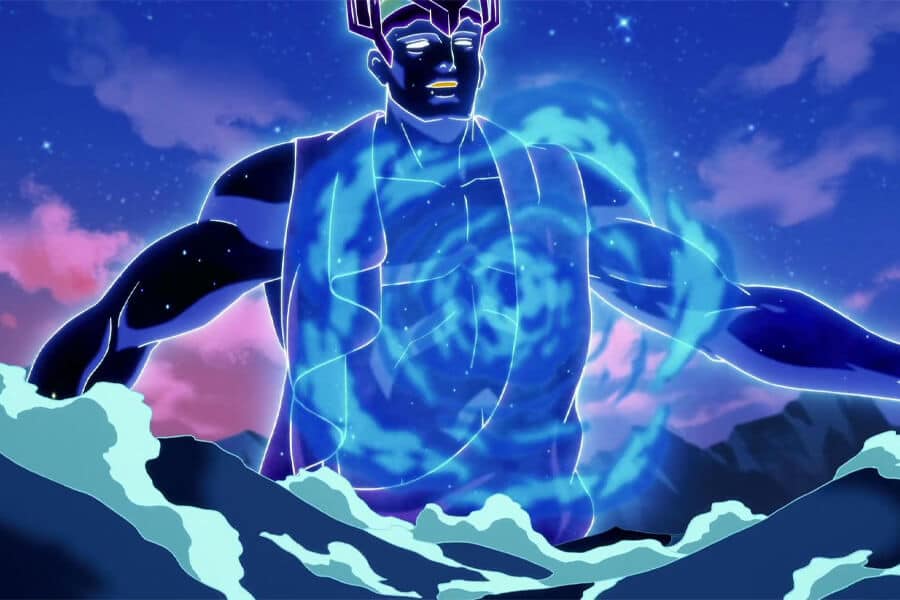
Picture: Kronos in Blood of Zeus – Netflix
Vlas: What’s cool is that we’ll see new alliances. Those pitted against each other in season one may team up in season three. But you know, I love that you said for season two, there wasn’t a bad guy per se; they are just characters who have strong wants that conflict with each other.
Jacob: I think that’s one of the things that impressed me about the second season. While I am a fan of action as much as the next person, I was looking forward to the interactions between characters more than anything.
Vlas: What was your favorite episode?–
Charley: The thing is, though, and I will say very quickly, that the goal was always, if we get to do five seasons, there was never an apocalypse or an end-of-day story in Greek Mythology. It didn’t really exist, there’s no Ragnarok, no end of days, and I also think that back then, Christianity so quickly overtook the religion that it was never completed. So the original pitch was that we eventually get to a know Ragnarok end-time story by the end of season five, and then it’s just a question of whether we’ll be afforded the opportunity to get there. We’ll see, but it’s the idea of, like, what happens, you know, to the gods and how their world came to an end—sorry bro.
Vlas: No, that’s great! I’m glad you mentioned that.
Charley: I will also say some amazing episodes are just great adventure action episodes in season three. There are two episodes that I love. I keep re-watching that I think people will love. So, there’ll be a lot of action and destruction and chaos and story and character development. But season three will be a freight train.
Vlas: So, what was your favorite episode?
Jacob: I would say it’s between Zeus’ trial and the episode where Hades tries to convince Seraphim to join him.
Vlas: Oh, that’s cool! Where Seraphim and the priestess–yeah.
Charley: I love those episodes; great choices!
Are you looking forward to watching Blood of Zeus season 2 on Netflix?

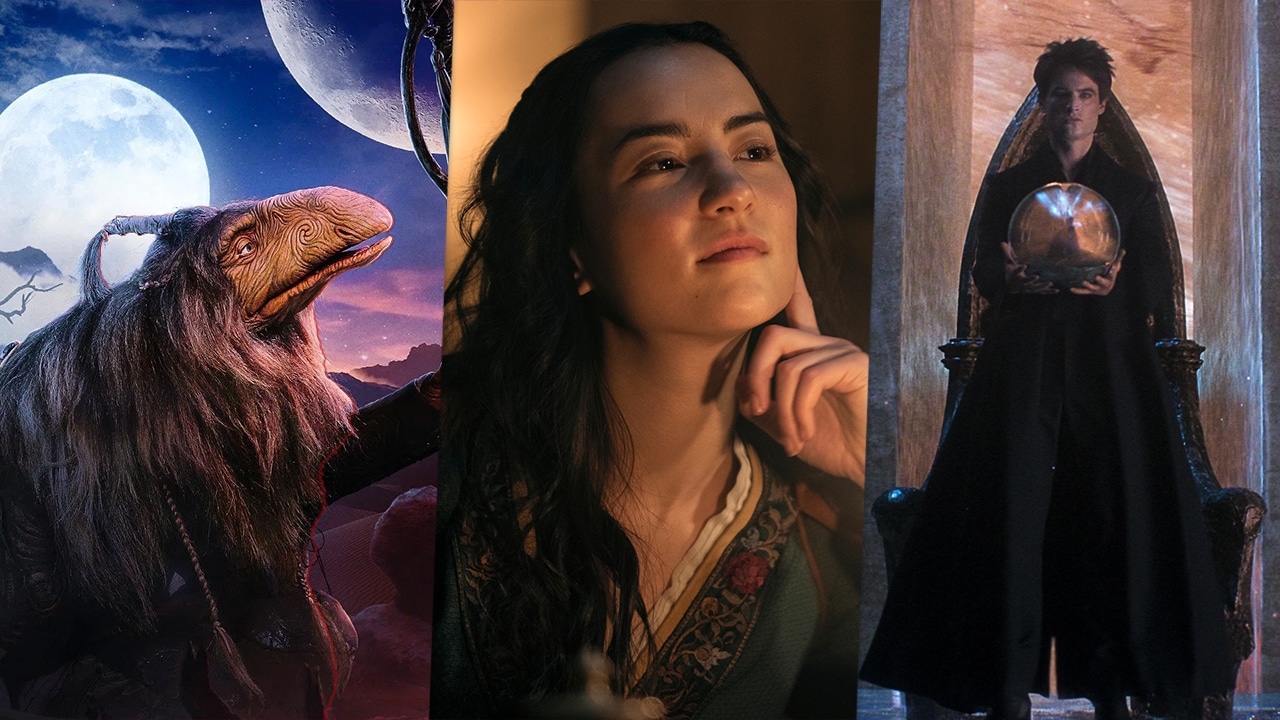
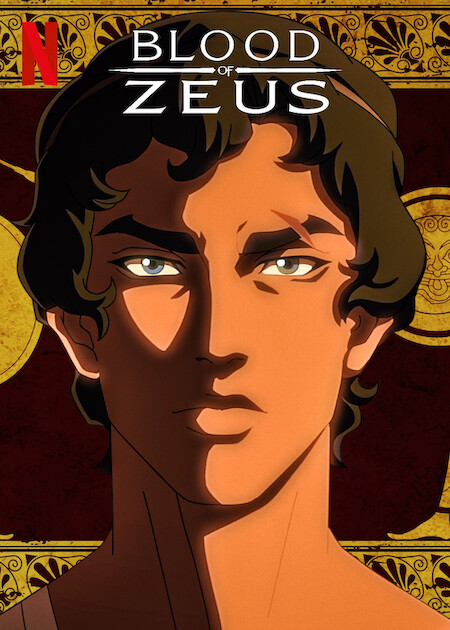 Rating: TV-MA
Rating: TV-MA